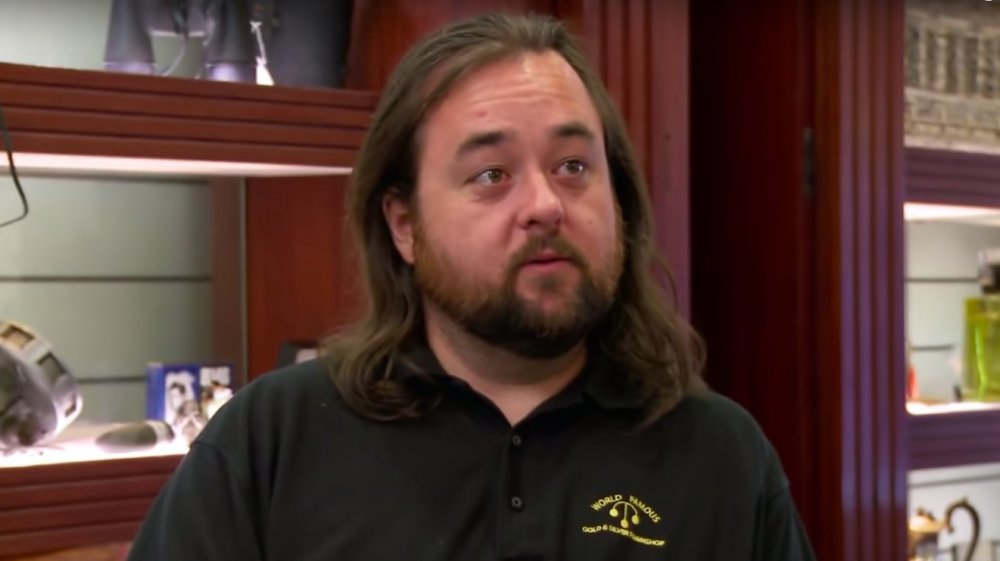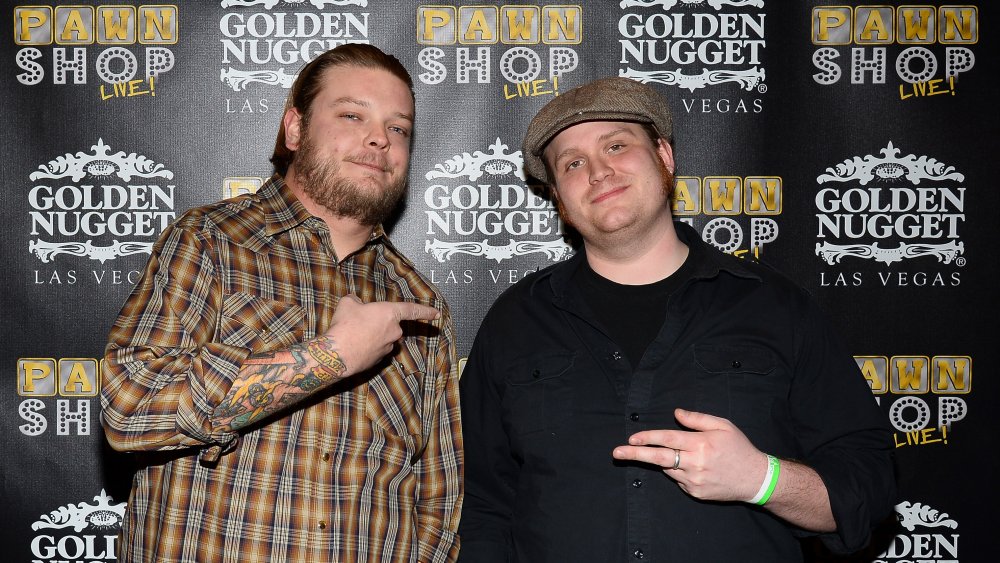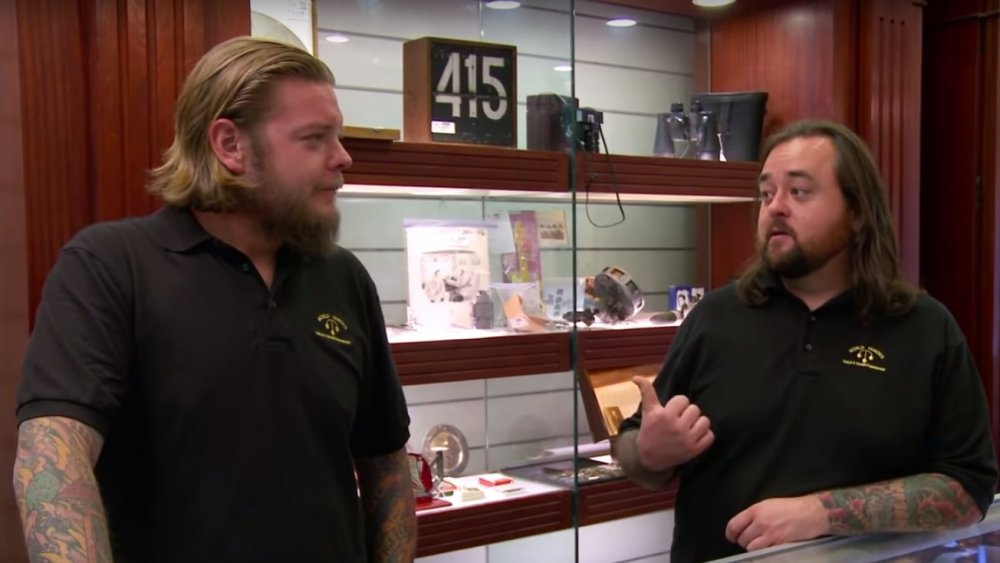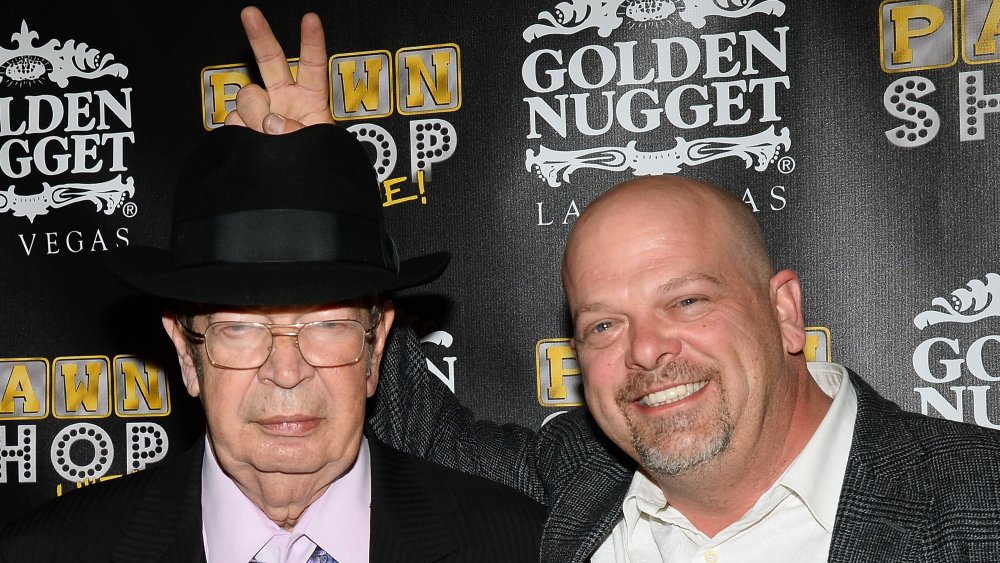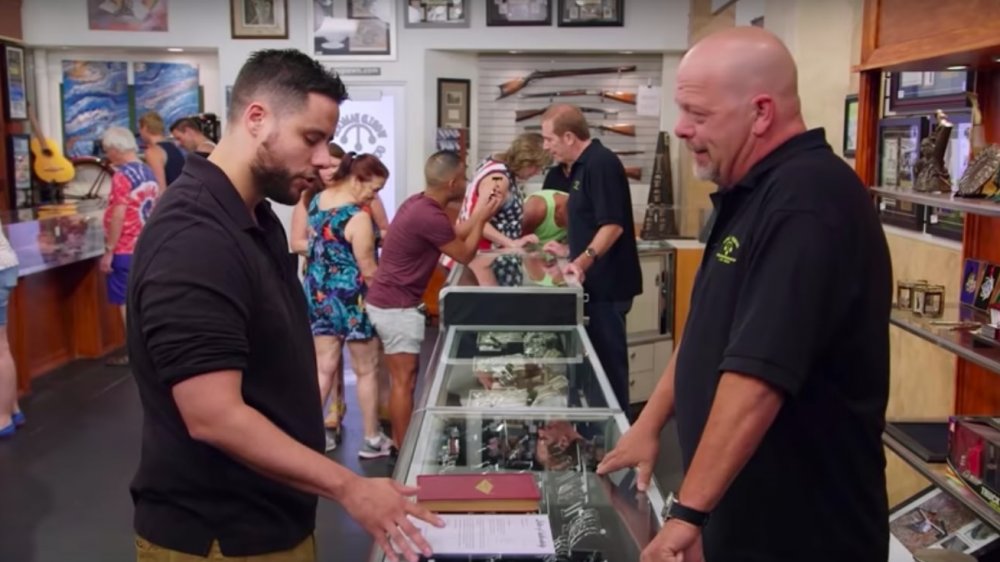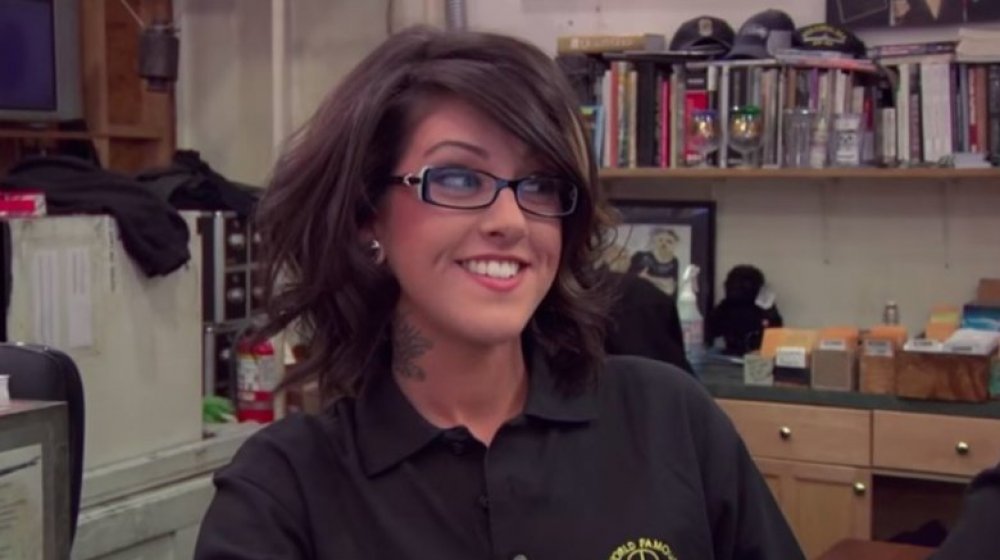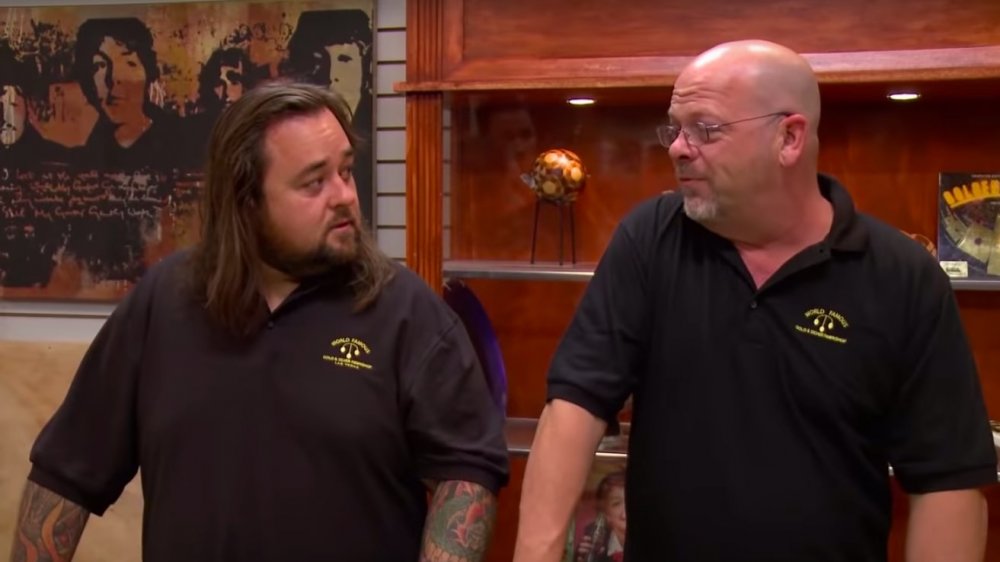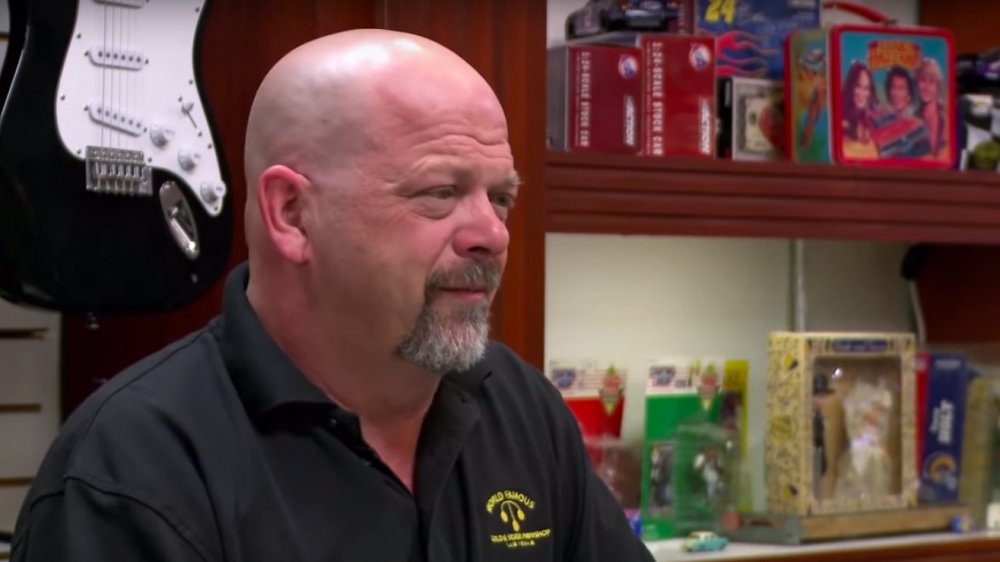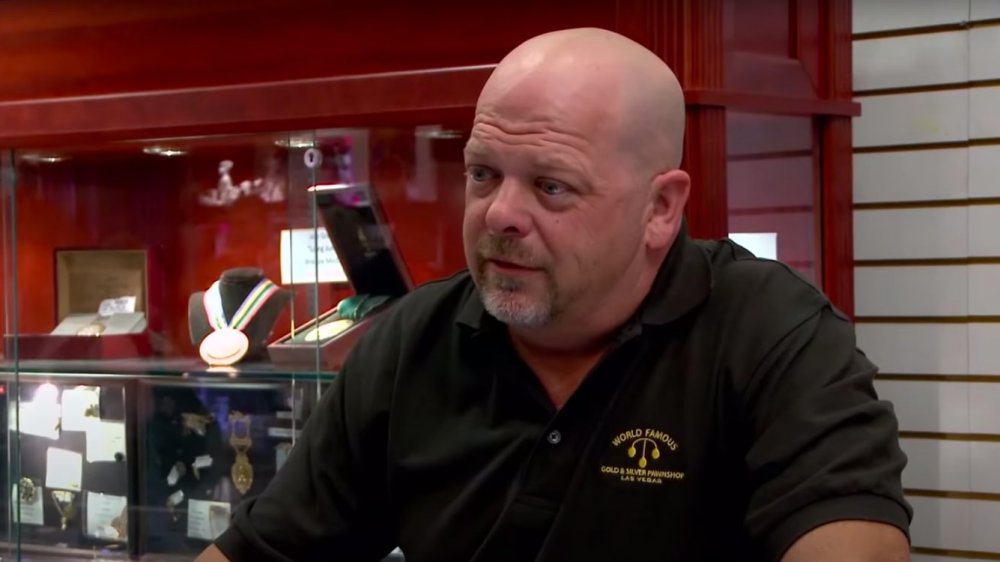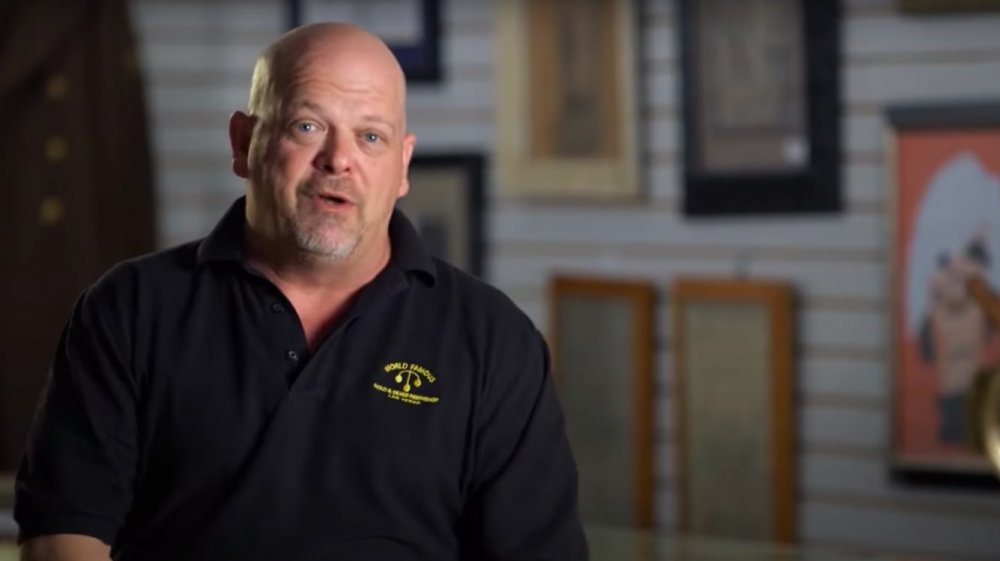Rules The Pawn Stars Cast Must Follow
Ever since the show premiered in 2009, millions of viewers around the world have been happily watching the cast of Pawn Stars negotiate deals for antiques and a wide variety of unique, valuable items at the Gold & Silver Pawn Shop in Las Vegas. Rick Harrison, Richard "Old Man" Harrison, Corey "Big Hoss" Harrison, and Austin "Chumlee" Russell have built up quite a following over the years, and although the Old Man passed away in 2018, the family business is still thriving.
But Pawn Stars is more than your average reality television show. Gold & Silver Pawn Shop is a legitimate business, so on top of the rules that the producers expect the cast to follow, they also have to operate within the boundaries of Nevada's laws. So what's really expected of the cast behind the scenes? What do they have to do to prepare for each episode? Can they just speak their minds on camera, or do they have to follow a script? We've looked behind the scenes of this long-running hit series to uncover a few of the rules that the cast of Pawn Stars have to follow, whether they're on camera or simply working in the shop without an audience.
No random items on Pawn Stars
At this point, it should come as no surprise to the fans of any reality TV show that what they're watching isn't always 100% authentic, and Pawn Stars is no different in that respect. But in fairness, with a show like Pawn Stars, it would be impossible to film a decent episode in a reasonable time frame without doing a little planning in advance.
One of the most important rules that the cast must follow is allowing the items that appear on each episode to be selected before the cameras start rolling. They can't simply let people in off the street and in front of the cameras with the hopes that it will make for good TV. It would just be too risky. Trying to shoot like this could easily mean wasting entire days of filming without having any remarkable items come into the shop. So when a seller brings a unique object up to the counter, the cast already knows what they're getting.
The shop shuts down during filming
Every single day, many people come to Las Vegas just to swing by Gold & Silver Pawn Shop in hopes of catching a glimpse of the cast. But as much as the fans would probably love to hang around while the crew is shooting, it's just not possible. This is because the shop actually closes while new episodes are being filmed. After all, they can't have too many random people wandering around the set while trying to shoot as it would probably result in countless fans attempting to get their faces on TV and getting in the way of the crew while they try to work.
Does this mean that business isn't really booming at the pawn shop? Nope, they do just fine, even though they do have to close on a regular basis for filming. So many people come by when the shop is open that they don't really have to operate on normal business hours to stay open. It's actually one of the most visited tourist attractions in Las Vegas.
The Pawn Stars can't work the counter
Fame does come with some unexpected consequences, and this is one that might be surprising to fans of Pawn Stars. The cast is no longer allowed to work behind the main counter. Why? It's actually because of Nevada's privacy laws. The producers felt that too many people were snapping photos of the cast, which meant that people milling around in the background would be caught on camera very frequently. This would be a violation of their right to privacy. Therefore, to be on the safe side, they keep the cast away from the crowds. However, the cast will occasionally pop out for photo opportunities.
When it's time to shoot the show, the general public has to make their exit. Yes, you'll notice people milling around in the background of most shots, but those aren't random customers who just wandered in off the street. Instead, they're extras who were already cast to be there.
The sellers must be vetted
When the cast and crew are checking out items that the sellers submit with the hopes of appearing on the show, they also have a discussion with the seller. They don't just want to haggle with people who happen to own interesting items with a fascinating history. They also want to make sure that they're talking with people who can be reasonable about prices. Therefore, they go through pre-negotiations with potential sellers.
Of course, every once in awhile, someone who appears on the show will be a bit unrealistic about the value of their item, and they won't budge when the cast makes a counteroffer. (And then there are the times when the guys on Pawn Stars have been ripped off.) But for the most part, the producers want to ensure that sellers are bringing in items that will not only be intriguing for the viewers to learn about, but that the sellers will be fair about their suggested prices. After all, going through hours and hours of filming without buying a single item would make for a pretty boring episode. Sellers are also given some coaching so that they will appear more confident on TV.
The Pawn Stars are following a script
Like most reality TV shows, the cast of Pawn Stars has to work off of a script. They can't just enter a negotiation blind and tell the seller whatever they feel. The writers already have a general idea of how things should play out in order to keep the audience entertained. They do their best to keep things natural and make it sound like an off-the-cuff conversation and, of course, they take the personalities of the cast members and their typical mannerisms into consideration. The script is supposed to be "organic," rather than coming across as stiff and unrealistic.
But does all of this planning and scripting mean that Pawn Stars is really fake? Not really. The items are real antiques that belong to normal people. They just happen to have been selected beforehand rather than just showing up at the shop on a whim. The sales are real, too, but the cast has already walked through the negotiation in advance to ensure that no one's time is being wasted. The audience is just seeing a polished version of all of these interactions.
Don't make the first offer
Yes, the negotiations for the show are basically pre-planned before it all goes down in front of the camera. But does the cast have any personal rules for negotiations to push the outcome in their favor? Absolutely. "You should never, ever, give the first number. As a buyer, you don't want to risk coming in first with a high price," Rick Harrison told CNN.
The cast knows that if they come into the negotiation with an asking price that exceeds the seller's expectations, they probably won't get the best deal that they could. Instead, they will always wait for the seller to set the asking price. That way, they can work from there and adjust their own requests with the aim of getting the most value for the shop. Fans probably know by now that this is one of their "trade secrets," as it's a pattern on the show. Yet it never stops sellers from coming to them to pawn their valuables and, as a result, there's been more than one occasion when the Pawn Stars have outsmarted their customers.
They've got to stay away from scandal
This might be in their official contracts, or it might just be an unwritten rule, but it seems pretty clear that the cast of Pawn Stars is expected to maintain a modest image when they're living their lives off camera. After working together for so long and becoming so popular, the cast understands that their audience and producers have come to expect this from them, but occasionally, issues do come up.
For example, after some pin-up photos of former cast member Olivia Black were leaked to the public, she ended up facing pretty serious consequences. The production company didn't want her appearing on the show anymore, although she was allowed to maintain employment with the pawn shop. She was fired from the show with little warning and was caught off guard by the decision. She could still work there, but she was no longer part of the official cast. Eventually, Black decided to quit the shop.
There are rules about what they can and can't buy
Even if a certain item has an incredible history and is still in great condition, the cast and crew can't accept just anything that they personally like. Before the vetting process for sellers and items even begins, they have certain rules to follow about what they can and can't buy. And there are actually some surprising items on the list of things that they won't accept.
For example, they can't take any items of antique furniture, as they simply don't have the room for it. Beanie Babies are off limits, so anyone who stocked up on these stuffed animals during the '90s and hoped that they would be able to sell them for a high price one day is out of luck. They do buy firearms on the show fairly often, but there are limits on this as well. They can only accept firearms that were manufactured in 1898 or earlier. As far as sports cards, they can't buy just anything. They're only in the market for sports cards that were printed from the '60s or before.
The Pawn Stars must report to law enforcement
Nevada has some pretty thorough legal restrictions for pawn shops. Obviously, there are plenty of these shops operating around the Las Vegas area, but they do have to operate within certain regulations. And yeah, pawn shops may be seen as a seedy business, so people might be surprised by all the rules that the state requires the shops to follow, even famous ones like Gold & Silver Pawn Shop. Behind the scenes, the Pawn Stars cast has a long to-do list to complete that might not be interesting for the viewers to watch, but it's crucial to keeping the shop running. One strange law that stands out? Pawn shops are required to keep a physical description of every seller on record.
Every sale has to be thoroughly documented, including details that people might find insignificant. The pawn shop buyers even have to give a description of the hair color, skin color, and facial appearance of the seller. You might assume that since all of the sellers on the show appear on camera, the rule might not apply, but just because their appearance was technically documented on film doesn't mean that the staff gets to skirt that particular rule. One of their other crucial daily responsibilities includes sending a daily report of all the shop's transactions to local law enforcement. If there are any legal issues with the sellers and their items, the police need to have everything in writing to deal with it.
The rule about appraising items
It might seem safe to assume that the cast would be able to personally appraise the items that potential sellers present, but that actually falls outside the realm of their responsibilities. In fact, the cast doesn't handle any appraisals. If a seller brings in an item of unknown origin, they're not the ones who will help them figure out what they have on their hands.
This might come as a disappointment to some sellers, but the cast is more than willing to help people connect with outside, third-party appraisal services and trusted individuals that they've worked with before. The Pawn Stars regularly bring experts on the show who are more than capable of helping out. But at the end of the day, the stars have to turn down all appraisal requests. After all, it would put way too much pressure on their staff to manage appraisals along with all of the other work that goes into running the business and the show.
The Pawn Stars are still working 9-5
The cast of Pawn Stars aren't typical reality TV stars. One major distinction between the Pawn Stars cast and the stars of other popular reality shows? Being on the series isn't really their main responsibility. They still have to show up and work most days, and while they can't be behind the main counter anymore, there's no shortage of things for them to do in the shop. Some of the cast members have other jobs, as well. When they're not at the shop, they're still putting in hours! For example, Chumlee spends several afternoons each week working in his candy store, where fans can stop in and see him on the job. Rick also owns his own bar, Rick's Rollin Smoke BBQ, where he bartends on weekends.
Perhaps this is one reason that Pawn Stars is still such a popular reality show. At the end of the day, the cast still has to get up in the morning, go to work, and do their jobs well, regardless of how famous they are. It's that feeling of relatability that has kept people watching for a decade.
The staff can't work with drunk sellers
Pawn shops can have a rough reputation, and it's easy to imagine that someone who works behind the counter would be willing to do business with almost anyone who walked through the door. But that's not how things go at Gold & Silver Pawn Shop — in fact, Rick Harrison has always made that clear. Harrison stated that he and his employees would not buy items from people who had clearly had too much to drink.
"If someone's really intoxicated or something like that, they don't know what they're doing, they don't know what they're getting into, and I'm not going to deal with it," Harrison said in an interview with NPR. "I tell my employees, a drink or two is fine, but if they're — got a good buzz on, it ain't happening." Harrison always wanted to illustrate that not all pawn shops deserved a bad rap, and that his shop could show a more positive side of the business. He made sure that everyone followed rules like this for a reason — he was a true professional.
They can't sell certain items
There are a few surprising rules at Gold & Silver Pawn, but perhaps the most surprising of all is the fact that Harrison actually keeps certain items off limits when it comes to sales. For instance, Harrison has admitted that he held on to certain highly valuable items for years. He kept several Olympic medals, Super Bowl rings, three NBA championship rings, and more. Instead of selling these objects, Harrison put them on display.
Why would a pawn shop owner hold on to extremely valuable items rather than selling them? When he got into the business, it was actually a smart sales tactic — people would see this impressive collection in the shop, and they figured that Harrison must be a savvy businessman. "It's what keeps people coming back into my store. Before I had the television show I needed that draw," Harrison told NPR. "We always have at least one Picasso on the wall."

